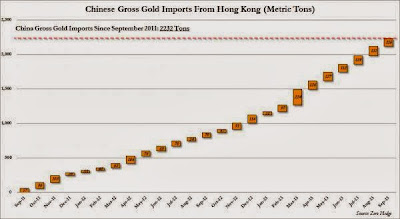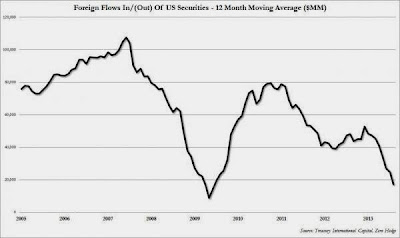We are following the groundbreaking changers coming out of China after The 3rd Plenum and PBOC drops another shell-bomb on the US Dollar today. We are witnessing the end of US Dollar as the Reserve Currency of Choice now. Who will be buying all these US Treasuries after that? How can FED Taper now? We can be assured about much higher interest rates with very far reaching implications for the economy and the U.S. fiscal budget.
Timing of this release is very interesting - just yesterday Gold was killed after the release of FOMC minutes. We are entering the new dramatic stage of the Currency Wars, when China picks the old Austrian economics truth - strong currency means strong country. How long Gold Smashing can keep it down with COMEX running on fumes and record high leverage?
And another move by China is reported by ZeroHedge:
And another move by China is reported by ZeroHedge:
China Fires Shot Across Petrodollar Bow: Shanghai Futures Exchange May Price Crude Oil Futures In Yuan
FOMC Minutes Reveal Taper Likely In "Coming Months" - Almost Definitely In Coming Years. Gold Smashed For Conviction
Gold: PBOC to ‘Basically’ End Normal Yuan Intervention, Zhou Says GLD, MUX, TNR.v, GDX
"Now we have a better insight into the recent record level Gold buying by China. Head of PBOC talks about currency flexibility and acceleration of yuan convertibility. All announced reforms target to jump start the new phase of Chinese economic growth with Internal Consumption becoming the main driver. In this situation stronger Yuan means stronger purchasing power in China, less US Treasuries buying (which is happening already) and higher commodity prices in US Dollar terms."
RJ Wilcox: China’s Central Bank Gold Reserves are Growing Rapidly GLD, MUX, TNR.v, GDX
"We are monitoring the situation with Gold demand from China as it is the main driver for the Gold market now. So far this demand has backed Gold to withstand the numerous attacks in the paper market to allow Janet Yellen to implement even more aggressive easing polices at the FED.
Rising Gold price indicates FIAT currency debasement, pushes real interests up, which economy and fiscal budget can not sustain at the moment. These official Gold holdings numbers are already out of date and the question is how much Gold China really already holds now and you can add to it the state level encouragement for citizens to accumulate Gold in China."
PBOC Says No Longer in China’s Interest to Increase Reserves
The People’s Bank of China said the country does not benefit any more from increases in its foreign-currency holdings, adding to signs policy makers will rein in dollar purchases that limit the yuan’s appreciation.
“It’s no longer in China’s favor to accumulate foreign-exchange reserves,” Yi Gang, a deputy governor at the central bank, said in a speech organized by China Economists 50 Forum at Tsinghua University yesterday. The monetary authority will “basically” end normal intervention in the currency market and broaden the yuan’s daily trading range, Governor Zhou Xiaochuanwrote in an article in a guidebook explaining reforms outlined last week following a Communist Party meeting. Neither Yi nor Zhou gave a timeframe for any changes.
China’s foreign-exchange reserves surged $166 billion in the third quarter to a record $3.66 trillion, more than triple those of any other country and bigger than the gross domestic product of Germany, Europe’s largest economy. The increase suggested money poured into the nation’s assets even as developing nations from Brazil to India saw an exit of capital because of concern the Federal Reserve will taper stimulus.
Yi, who is also head of the State Administration of Foreign Exchange, said in the speech that the yuan’s appreciation benefits more people in China than it hurts.
‘Less Interventionist’
His comments are “consistent with the plans to increase therenminbi’s flexibility so they become less interventionist,”Sacha Tihanyi, senior currency strategist at Scotiabank in Hong Kong, said by phone today. The central bank may widen the yuan’s trading band in “the coming few months,” he added.
The yuan’s spot rate is allowed to diverge a maximum 1 percent on either side of a daily reference rate set by the People’s Bank of China. The trading range was doubled in April 2012, after being expanded from 0.3 percent in May 2007. The band could be widened to 2 percent, Hong Kong Apple Daily reported today, citing an interview with the Hong Kong Monetary Authority’s former chief executive Joseph Yam.
Capital inflows into China accelerated in October, official data suggest. Yuan positions at the nation’s financial institutions accumulated from foreign-exchange purchases, a gauge of capital flows, climbed 441.6 billion yuan ($72 billion), the most since January.
About half of October’s increase in the positions was attributable to surpluses in trade and foreign direct investment, with the rest accounted for by inflows of “hot money,” Goldman Sachs Group Inc. Hong Kong-based analysts MK Tang and Li Cui wrote in a Nov. 18 note.
Stronger Yuan
The yuan has appreciated 2.3 percent against the greenback this year, the best-performance of 24 emerging-market currencies tracked by Bloomberg. Non-deliverable 12-month forwards rose 0.2 percent this week and reached 6.1430 per dollar on Nov. 20, matching an all-time high recorded on Oct. 16. The currency was little changed at 6.0932 as of 10:33 a.m. in Shanghai today.
“It appears that many in the People’s Bank think the time is about right to scale back currency interventions,” Mark Williams, London-based chief Asia economist at Capital Economics Ltd., wrote in an e-mail yesterday. “But China has got itself into a situation where stopping intervention will be very hard to do” and comments such as Yi’s will spur speculative inflows, he added.
Less intervention and smaller gains in foreign-exchange reserves may damp China’s appetite for U.S. government debt. The nation is the largest foreign creditor to the U.S. and its holdings of Treasuries increased by $25.7 billion, or 2 percent, to $1.294 trillion in September, the biggest gain since February. U.S. government securities lost 2.6 percent this year, according to the Bloomberg U.S. Treasury Bond Index. (BUSY)
Yi’s comments didn’t imply China will be cutting its holdings of U.S. government debt, said Scotiabank’s Tihanyi. “They are probably going to keep their allocations reasonably stable unless there’s a big policy shift, but it means they will possibly be buying less at the margin,” he said.
To contact Bloomberg News staff for this story: Xin Zhou in Beijing at xzhou68@bloomberg.net; Fion Li in Hong Kong at fli59@bloomberg.net"









No comments:
Post a Comment